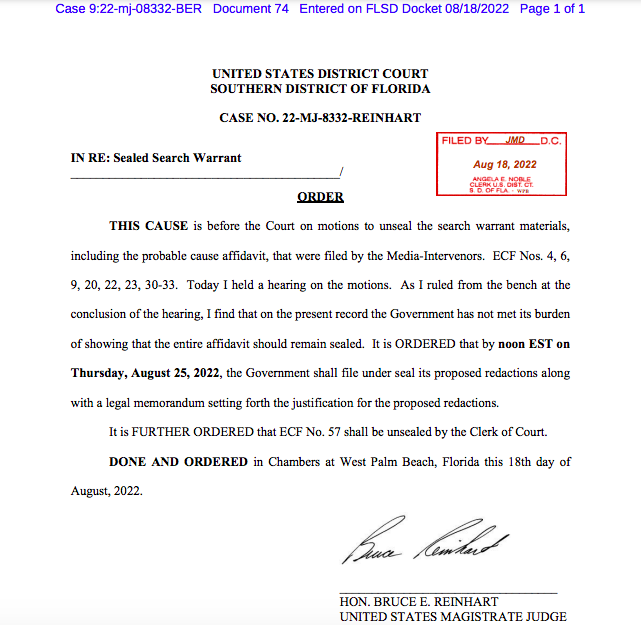A magistrate judge will unseal further Justice Department records related to the FBI’s unprecedented raid of former President Donald Trump’s Mar-a-Lago home — though how much of the affidavit itself will be made public remains unknown.
Magistrate Judge Bruce Reinhart, who signed the Aug. 5 warrant for the Aug. 8 raid by the FBI, ruled that he would make public — with redactions — the DOJ motion to seal the warrant and affidavit, the previous court order sealing those records, and the criminal cover sheet for the search warrant, according to media reports.
Reinhart also indicated that he may partially unseal the affidavit itself, ordering the Justice Department to file a redacted version of the raid affidavit by next Thursday.
“I find that on the present record the Government has not met its burden of showing that the entire affidavit should remain sealed,” the judge said in a short ruling after the hearing, ordering that “the Government shall file under seal its proposed redactions along with a legal memorandum setting forth the justification for the proposed redactions” by noon next Thursday.
The judge said in court that “I’m not prepared to find that the affidavit should be fully sealed,” according to CNN, adding there were likely “portions” of it that could be made public.
The DOJ announced this week it was opposing the release of the underlying justification for its unprecedented search, just days after it agreed to unseal the FBI warrant for the search of Trump’s Florida resort.
Justice Department lawyers had told the court the DOJ “does not object to unsealing other materials filed in connection with the search warrant whose unsealing would not jeopardize the integrity of this national security investigation, subject to minor redactions to protect government personnel.”
Those documents are now supposed to be posted on the court docket. The hearing in the judge’s West Palm Beach courtroom began around 1 p.m., and news began to trickle out slowly.
INSIDE TRUMP’S CHAOTIC RUSSIA DECLASSIFICATION EFFORT
Jay Bratt, the chief of the Justice Department’s counterintelligence and export control section, argued for the DOJ in court on Thursday.
“In this case, the court has found probable cause there’s a violation of one of the obstruction statutes, and that evidence of obstruction would be found at Mar-a-Lago,” Bratt told the judge, with CNN reporting that he argued the affidavit contained “substantial grand jury information.”
Bratt said the investigation is “open” and “in its early stages” when arguing against unsealing the affidavit, Politico reported, with the DOJ official claiming that unsealing the affidavit “serves no purpose” and “does not edify the public in any meaningful way” because of how many redactions the DOJ says it would have to make to the document before putting it in public view.
A number of news outlets, such as the Wall Street Journal, Associated Press, New York Times, and Washington Post, joined together to push for the affidavit’s release. The Washington Examiner also argued the affidavit must be unsealed.
But Chuck Tobin, a lawyer for the media groups, countered that “the public interest could not be greater,” according to Politico, and said the raid on Mar-a-Lago was “one of the most significant events in the nation’s history.”
“The affidavit of probable cause should be released to the public, with only those redactions that are necessary to protect a compelling interest articulated by the government,” the media outlets argued in court filings, adding that “public interest extends to the affidavit of probable cause in this matter, which outlines the government’s basis for the extraordinary step of seeking the warrant to search a former President’s home.”
But the Department of Justice is fighting the release of the affidavit, including in court on Thursday.
“There remain compelling reasons, including to protect the integrity of an ongoing law enforcement investigation that implicates national security, that support keeping the affidavit sealed,” DOJ lawyers declared on Monday, arguing that, unlike unsealing the warrant, “disclosure at this juncture of the affidavit supporting probable cause would, by contrast, cause significant and irreparable damage to this ongoing criminal investigation” and worried the affidavit could serve as a “roadmap to the government’s ongoing investigation.”
Trump is being investigated for a possible Espionage Act violation and possible obstruction of justice, according to the warrant unsealed Friday.
Thursday’s hearing comes after Attorney General Merrick Garland said last week that he “personally approved the decision to seek a search warrant.”
CLICK HERE TO READ MORE FROM THE WASHINGTON EXAMINER
The items seized by the FBI last week allegedly included “various classified / [top secret] / [sensitive compartmented information] documents,” four “miscellaneous top secret documents,” three “miscellaneous secret documents,” two “miscellaneous confidential documents,” and one “confidential document.”
Trump and his allies have claimed he declassified the records, with the former president contending he had a “standing order” throughout his presidency that “documents removed from the Oval Office and taken to the residence were deemed to be declassified the moment he removed them.”

